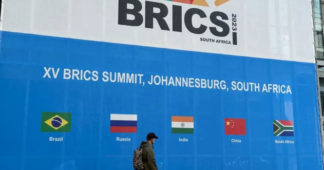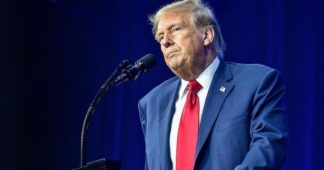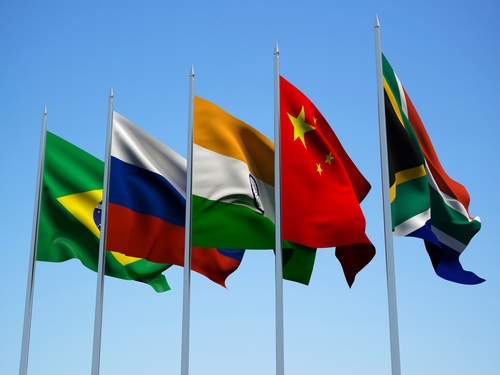NIMA ALKHORSHID: Michael, we had nine countries joining BRICS as BRICS partners. We have Indonesia, Malaysia, Cuba, Bolivia and other countries. And what are the leading aims of the BRICS countries in your opinion?
MICHAEL HUDSON: The leading aims?
NIMA ALKHORSHID: The leading aims of BRICS countries?
MICHAEL HUDSON: Well, you’ve put your finger on the problem. They haven’t spelled out the aims at all. They haven’t spelled out what is a policy? And how are you going to have a policy for BRICS just by saying we want prosperity? Okay. We want our economic independence and sovereignty. But what are the aims going to be specifically? And how are you going to get a widely politically diverse set of countries to have a common set of aims?
Well, it’s pretty obvious to see just empirically what the aims logically would be. The first aim is you need to cope with the foreign debt problem. There is no way that the BRICS countries can grow and at the same time pay the foreign debts that they’ve been saddled with for the last 100 years and especially since 1945 by the neoliberal philosophy that’s been pushed by the United States and the International Monetary Fund and the World Bank.
The policies that have been imposed on the BRICS countries have forced them into a chronic balance of payments and trade deficit as a result of their dependency on the United States and its allies that have made them not viable countries. That means that the loans that were made to these countries have no chance of being paid. And this is something that I’ve worked on since the mid-1960s when I was a balance of payments economist, first for now Chase Manhattan Bank, then for the United Nations at UNITAR, and then for various… when I organized the first sovereign debt fund in 1989 through Scudder Stevens to invest in Argentinian and Brazilian debts. It was when the United States and other bondholders began to buy Latin American debts after the 1982 default of Mexico led to the Latin American debt crisis.
Nobody would really buy these bonds, and Scudder Stevens was unable to sell any bonds to American buyers or to European buyers, because they all thought that, well, there’s no way that they can pay these debts. And they hired me as an advisor for the fund saying, “Well, Dr. Hudson, you’re known as Dr. Doom. We know that you say that debts can’t be paid. Do you think they can be paid maybe for five years? Suppose we know that the economies can’t pay, but is there an interim that we can still get these high interest rates that they have to pay? And I found out who was buying these bonds that Merrill Lynch, the underwriter, was selling.
They were all bought in Argentina, Buenos Aires, and Brazil by the client elite of these countries, the central bankers, the president’s administrations, all the elites. And the fact is that the people that hold these dollar bonds are client oligarchies who don’t want to hold their own currencies because the global south countries and their oligarchies realize the debts can’t be paid. The European investors realize the debts can’t be paid. They’re selling to the vulture funds, basically. And this is a problem for the BRICS countries. On the one hand, the BRICS countries, in order to grow, have to write down their debts.
But on the other hand, the money of the holders of the debts and supporting of the dollar and opposing de-dollarization are their own vested interests. So the vested interests in many of the BRICS countries are not favoring the national interests. That’s the big conflict you have between the fact that these countries are bifurcated between a U.S.-centered elite and the country as a whole. Well, that’s one of the two issues that the BRICS will have. The second is what are you going to do about the fact that as a result of the debt crisis, these countries have been driven by the World Bank and the International Monetary Fund and U.S. policy to sell off their oil, mineral rights, their natural resources, their natural monopolies of public infrastructure to foreign investors.
How on earth can they grow if all of their national patrimony and all of the revenue, the land rent, the raw materials rents, the monopoly rents from this national patrimony is paid to foreigners? Well, you could look at the BRICS countries in very much the same way as Russia under the kleptocrats. Russia did have a solution to the kleptocrats. And that solution was a rent tax. Suppose that you take the kleptocrats who bought the nickel, Noros nickel, or Gazprom, Russia could have recovered all the revenue from nickel, oil and the other raw materials, diamonds, the other raw materials being sold off to say, well, we’re going to let you make profits on your capital investment. I think their capital investment was maybe 100 rubles, maybe a couple of dollars, and you’ve got billions.
So you can make profit on that, but all of the natural resource rent, that’s going to be taxed away. This was exactly how Britain became the workshop of the world, and then the United States. And Germany followed it. The whole logic of industrial capitalism was to free economies from the landlord class and its land rent, to free economies from economic rent. And that was what classical value theory from Adam Smith, John Stuart Mill, Marx, the American economists all said, “we want to prevent rent seeking to make a low to bring prices in line with actual cost of production.” That’s what enabled England first to become the workshop of the world, and then enabled the United States and Germany to replace England by creating a mixed public-private economy with its own national control of money.
The BRICS countries could follow this policy that made first England and then America and Germany able to organize their industrial takeoff. But in order to do that, you have to have a concept of freeing economies from economic rent. You have to have a concept that basically goes back to Adam Smith. His idea of a free market was a market free of economic rent. All throughout the wealth of nations, he said, the landlords should be taxed.
If you tax away the landlords, then you won’t have this alien external power over the economy extracting its revenue in the form of rent. All of that was the great fight over value and price theory that occurred at the end of the Napoleonic Wars in 1815 when the landlord class of England wanted to impose the corn laws to prevent low-priced food exports so that the landlords could keep their agricultural rents high. That was the great fight that shaped England’s political conflict for 30 years until the Corn Laws were finally repealed in 1846.
So, if the BRICS economies said, we’re going to recover our natural patrimony from the kleptocrats, not our own kleptocrats only, but the foreign companies that have bought our oil and glass, we’re going to use that as our natural, our fiscal base. And that we’re going to use that fiscal base to finance our own economic development. Well, then you’re going to essentially be able to do in this century what the late 19th century European countries did. The problem is you need an economic theory for that. And most of the BRICS country economists, like Chinese economists, have been trained in the United States, and there is no history of economic thought taught in the United States anymore. There’s no economic history that’s being taught, and so the BRICS countries aren’t even aware that their natural economic interest is to get rich in the way that the United States did. And what they do see is China’s remarkable economic takeoff.
And China calls this socialism with Chinese characteristics, but it could be called the American economics takeoff with Chinese characteristics, because that’s the American economic takeoff. Oh, it was considered socialist because it relied so heavily on the public sector.
And there’s a third aim that the BRICS countries should have, and that has to be to raise living standards and raise labor productivity. Because you can’t have a class war against labor and expect labor to be highly educated, well-fed, well housed, and productive. If you want productive labor, you’re going to have to raise living standards. And the vested interests in most of these BRICS countries want to keep wages low. If they have factories or whatever their business is, they look at labor’s wages as being antithetical to themselves. And the way that the United States solved this problem was to say, okay, we know that you industrialists don’t want to pay high wages to labor.
But what we’ll do is have the government pick up many of the costs of living for labor. The cost of education, the cost of health care, the cost of low-priced transportation, communications. And so that you don’t have to pay labor high enough wages to pay for its own health care, education, and all of that. Well, obviously that’s not what the United States is doing today. You’re having just the opposite. You’re having American employers having to pay enormously high wages because the government is no longer providing these services. The BRICS countries can realize we’re not going to follow the neoliberal U.S. economic advice to privatize everything and build rent-seeking into the price of breaking even and earning a living wage in our countries.
Again, you need an economic theory and economic doctrine for this. The doctrine was what 19th century classical economics was all about. And I don’t see any sign of the discussion of this doctrine emanating from the BRICS countries. I’ve done my best to go to Russia, China, and Cuba, and other countries. I’ve tried to explain to Cuba how it could apply a rent tax. And I’ve gotten sort of blank stares from Castro’s cabinet and the people who followed them. So the whole problem is that the BRICS countries know that they want to get rich, but they don’t know that they don’t have to reinvent the wheel.
The way to create a prosperous economic growth is to avoid private debt. Keep debt and money creation domestic. The debts you owe are in your own currency and you control your own currency in the same way China does, through a public bank, not through private commercial banks. You want a tax and economic rent and unearned income to encourage earned income by actually being part of the production process, not part of the rent-seeking whole superstructure just as extracted from this. And you want to create a prosperous domestic labor force so that it can become high productivity.
That’s how the United States developed so high productivity labor force itself. The way in which the BRICS countries can follow their national interest is clear, but you need a doctrine for that and an economic philosophy. That’s the missing element that I see right now.
Excerpt from an interview of Michael Hudson
We remind our readers that publication of articles on our site does not mean that we agree with what is written. Our policy is to publish anything which we consider of interest, so as to assist our readers in forming their opinions. Sometimes we even publish articles with which we totally disagree, since we believe it is important for our readers to be informed on as wide a spectrum of views as possible.











